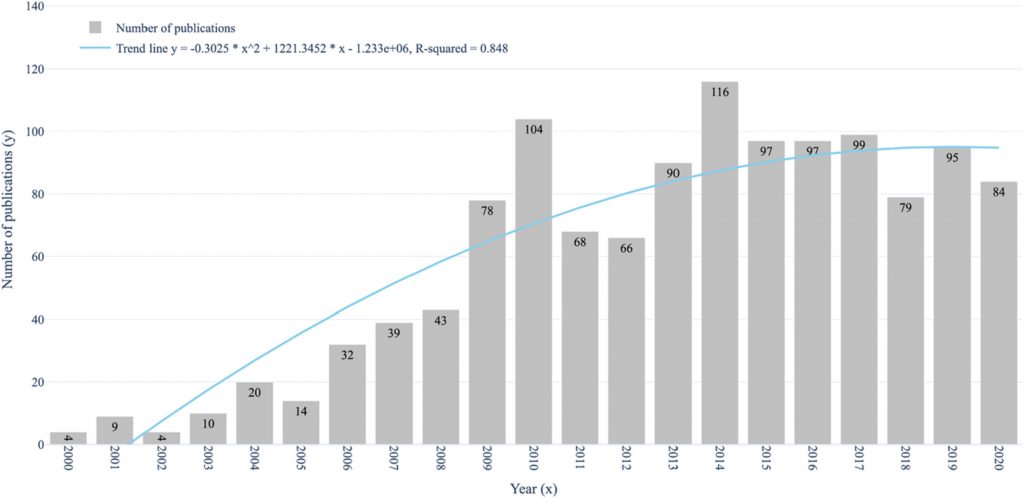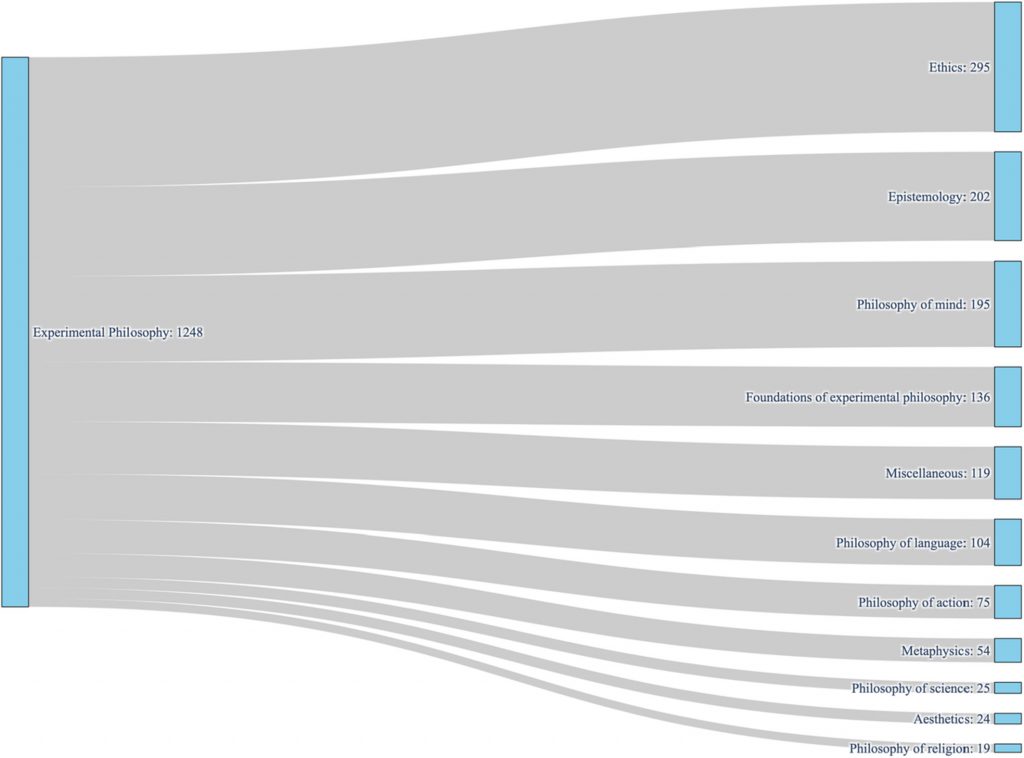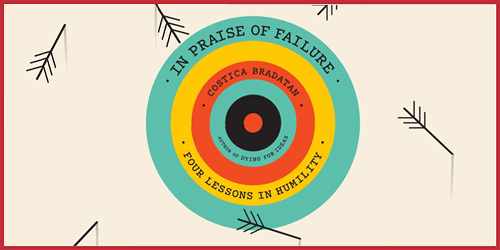The Development of Experimental Philosophy
A recent survey of publications in experimental philosophy provides a picture of the field’s growth and range.
In “Twenty Years of Experimental Philosophy Research,” published recently in Metaphilosophy, Jincai Li (Normal University) and Xiaozhen Zhu (Guangdong University) take a bibliometric look at X-phi.
They write:
X-phi has undergone roughly four developmental stages over the past two decades, namely, the initiation period (2000–2005), the development period (2006–2010), the expansion period (2011–2015), and the plateau period (2016–2020). Although works in the first period had paved the way for later development of this experimental approach to philosophical inquiries, the key umbrella term “experimental philosophy” did not come into widespread use until 2006. Since then, it has remained at the center of heated discussion. Over the next fifteen years or so, x-phi evolved from negative research programs with the slogan of “burning the armchair” to the more positive and interdisciplinary projects that embrace more armchairs, becoming a fascinating part of the broad enterprise of cognitive science. This characteristic change of x-phi is showcased in part by the wide array of research topics covered in this area and in part by the diverse academic journals that host the scholarly output on these topics.
Let’s turn to the data. Here’s a look at x-[hi’s growth, in terms of numbers of publications, since 2000:

Annual number of publications in x-phi in all categories, 2000–2020. (From “Twenty Years of Experimental Philosophy Research” by Jincai Li and Xiaozhen Zhu.)
The most popular of x-phi’s subfields is ethics, Li and Zhu find, followed by epistemology and philosophy of mind:

Number of experimental works in each subcategory published in the period 2000 to 2020. (From “Twenty Years of Experimental Philosophy Research” by Jincai Li and Xiaozhen Zhu.)
In which journals is x-phi typically published? Philosophical Psychology, Review of Philosophy and Pyschology, and Mind and Language lead the list, report Li and Zhu:
| RANK | JOURNAL NAME | NUMBER OF
PUBLICATIONS |
| 1 | Philosophical Psychology | 84 |
| 2 | Review of Philosophy and Psychology | 66 |
| 3 | Mind and Language | 50 |
| 4 | Cognition | 43 |
| 5 | Synthese | 42 |
| 6 | Philosophical Studies | 36 |
| 7 | Cognitive Science | 26 |
| 8 | Journal of Business Ethics | 24 |
| 9 | Journal of Cognition and Culture | 20 |
| 10 | Philosophy Compass | 19 |
| 11 | Philosophy and Phenomenological Research | 18 |
| 12 | Consciousness and Cognition | 17 |
| 13 | Analysis | 16 |
| 14 | Inquiry: An Interdisciplinary Journal of Philosophy | 15 |
| 15 | Behavioral and Brain Sciences | 14 |
| 16 | Episteme | 13 |
| 17 | Metaphilosophy | 13 |
| 18 | Journal of Consciousness Studies | 11 |
| 19 | Journal of Theoretical and Philosophical Psychology | 11 |
| 20 | Australasian Journal of Philosophy | 10 |
| 20 | Erkenntnis | 10 |
| 20 | Journal of Experimental Social Psychology | 10 |
| 20 | Noûs | 10 |
The authors also provide a list of the thirty most “influential” publications in experimental philosophy, using citation rates adjusted to take into account the “time effect of publishing”. Their metric, “relative citation rate” (RCR) is arrived at by dividing the number of citations of a work by the average citations of any paper in the same year it is published. Here are the top ten from that list:
| TITLE | AUTHORS | TYPE | YEAR | SOURCE | GOOGLE CITATIONS | RCR | |
| 1 | The Essential Moral Self | Nina Strohminger and Shaun Nichols | Journal article | 2014 | Cognition | 491 | 23.38 |
| 2 | The Affective Dog and Its Rational Tale: Intuition and Attunement | Peter Railton | Journal article | 2014 | Ethics | 243 | 11.57 |
| 3 | Philosophy Within Its Proper Bounds | Edouard Machery | Book | 2017 | Oxford University Press | 254 | 11.55 |
| 4 | The True Self: A Psychological Concept Distinct from the Self | Nina Strohminger, Joshua Knobe, and George Newman | Journal article | 2017 | Perspectives on Psychological Science | 240 | 10.91 |
| 5 | Folk Moral Relativism | Hagop Sarkissian, John J. Park, David Tien, Jennifer Wright, and Joshua Knobe | Journal article | 2011 | Mind and Language | 222 | 10.57 |
| 6 | Atheists and Agnostics Are More Reflective Than Religious Believers: Four Empirical Studies and a Meta-Analysis | Gordon Pennycook, Robert M. Ross, Derek J. Koehler, and Jonathan A. Fugelsang | Journal article | 2016 | PLoS ONE | 214 | 9.30 |
| 7 | Estimating the Reproducibility of Experimental Philosophy | Florian Cova, Brent Strickland, Angela Abatista, Aurélien Allard, et al. | Journal article | 2021 | Review of Philosophy and Psychology | 120 | 9.23 |
| 8 | Expertise in Moral Reasoning? Order Effects on Moral Judgment in Professional Philosophers and Non-Philosophers | Eric Schwitzgebel and Fiery Cushman | Journal article | 2012 | Mind and Language | 428 | 9.11 |
| 9 | Nothing at Stake in Knowledge | David Rose, Edouard Machery, Stephen Stich, Mario Alai, Adriano Angelucci, et al. | Journal article | 2019 | Noûs | 76 | 8.44 |
| 10 | The Role of Conscious Reasoning and Intuition in Moral Judgment | Fiery Cushman, Liane Young, and Marc Hauser | Journal article | 2006 | Psychological Science | 1370 | 7.83 |
In discussing their findings, Li and Zhu say that “To move out of the plateau stage and make further progress in a sustainable manner, experimental philosophers need to expand their research territory and upgrade their tool kits.” You can read the whole article here. Discussion welcome.



Is there a simple explanation of how they operationalized the concept of “experimental philosophy paper” to get the counts? I would think there are at least some vague cases where it’s unclear whether it’s experimental philosophy or straight up behavioral or cognitive psychology (some of Tania Lombrozo’s work on how people think about belief and explanation seems very similar to experimental philosophy to me, though I probably wouldn’t classify it as such), and probably some vague cases on the other end where people are asking philosophical questions about the methodology of experimental philosophy without actually running experiments.
Yes, I had the same question. I thought the Railton paper fell on the latter category, but I might be misremembering.
I was taken aback by the inclusion of Railton’s paper. It’s a lovely paper, and it certainly *discusses* experimental philosophy, but I wouldn’t call it a work of experimental philosophy in its own right.
I hope the authors of this paper will join the conversation themselves — and it will certainly be very helpful to hear their thoughts on all of these issues — but the answer to this particular question seems to be pretty clear from the description of the methods within the paper itself.
What they say there is that the criterion they used to decide whether or not a given paper counts as experimental philosophy is whether or not that paper was listed within the “experimental philosophy” section in PhilPapers.